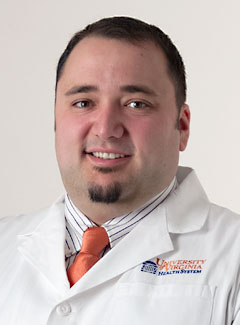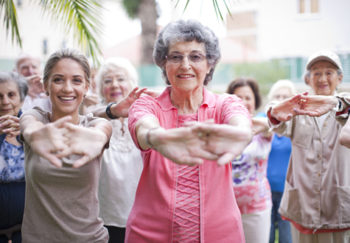As you age, your risk for certain health issues changes. We talked with Karl Clebak, MD, for his advice on things to keep an eye on during your 30s and tips to stay healthy throughout the coming years. Clebak is a primary care doctor who works at the UVA Lake Monticello and Zion Crossroads Primary Care clinics.

Keep It Up
Healthy habits and life choices in your 20s and 30s “will lay the foundations for health that carry over for the rest of your life,” says Clebak.
Losing or Maintaining a Healthy Weight
Keep up the exercise, healthy diet, regular doctor visits and vaccinations. As you enter your 30s metabolism starts to slow down, so without regular exercise and a healthy diet, maintaining a healthy weight can be a challenge. It is recommended that you try to exercise at least 30 minutes a day, five days a week.
“The most successful diets tend to have diet logs incorporated. The logging of your diet holds you more accountable,” Clebak says. The most important thing is to not give up, make progress each week and stick with it.
Routine Screenings
Continue with your regular screenings for:
- High blood pressure
- Weight and BMI
- Cholesterol every 5 years, unless there is an increased risk of heart disease
- STDs – gonorrhea and chlamydia
- HIV
- Cervical cancer — get a pap smear and HPV test every 5 years (women)
“People will often not realize they have high blood pressure, high cholesterol or diabetes until something catastrophic happens such as a major health event,” warns Clebak.
Women: New to Think About
Having a Baby
If you’re thinking about having a baby, it’s important to discuss the plans with your doctor. A regular multivitamin with a folic acid supplement is recommended if you’re pregnant or planning to become pregnant. Learn more about the pregnancy & birth services at UVA.
Women: What to Watch For
Cancer Risk
If at least one of your family members has had breast, ovarian or other BRCA related cancers you are at a higher risk. Discuss a referral with your doctor to one of our cancer clinics where they can do a screening or genetic test.
Health Hacks By Age
Take Charge of Your Health: Young Adults in Their 20s
Men: New to Think About
Mental/Emotional Health
Depression can affect men just as much as women. Health, career struggles, alcohol abuse or finances are just some of the stressors that can lead to depression. We screen for depression and alcohol misuse.
If you’re feeling down without an obvious cause, you should seek help from an expert.
Make an appointment at one of our psychiatry locations.
Men: What to Watch For
Testicular Cancer
Testicular cancer is the leading form of cancer in males between ages 15 and 35.
Regular screenings are not currently recommended; however, seek medical attention if you are experiencing any of the symptoms.
Lay the Foundations for a Healthy You
By establishing healthy practices now and working with your doctor on routine screenings you can make changes that could prevent health problems down the road. Clebak says, “Stick with it, don’t be overwhelmed, talk with your health care professional about laying the roadwork for a healthy you.”

